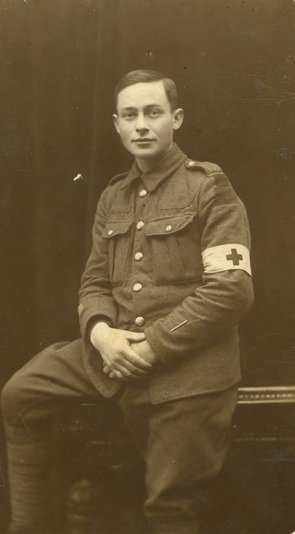Canadian Overseas Expeditionary Force
Service Number 742837

Two years later the war that most thought would be over in a few months raged on. Ora was now 20 years old and he felt compelled to enlist and do his part. He enlisted on March 1, 1916. From March to May of 1916 he trained in Saint John, NB with the 115th Battalion. He then travelled to Quebec where he trained for the next few months in preparation for overseas service.
He was next sent to Halifax where he boarded the SS Olympic. He disembarked in the United Kingdom and trained in Bramshott where he received rifle and machine gun training. He was sent to Le Havre, France in 1917 where he was taken on strength by the 26th Battalion and worked behind the lines at Vimy ensuring that food, ammunition and supplies reached the soldiers.
Thorne became a stretcher bearer while with the 26th. He continued in this role until the end of the war. Thorne would go on to see action at the battle for Hill 70 in August of 1917 and at Passchendaele in the fall of 1917. He was wounded in November of 1917 when a shell struck the ground in front of him. Ora fell in to a hole and didn’t realize he had been wounded until he got up and felt blood. He recovered in the hospital for a two-week period. Ora would go on to serve at the Battles of Amiens and Canal Du Nord in 1918, two significant battles from Canada’s Hundred Days. The First World War was declared over in November of 1918.
After the armistice, Ora went to Cologne, France for several months where he did guard duty. Before returning home, Ora was one of a few of the 26th Battalion chosen to parade before King George V in London. Ora was sent home with thousands of other Canadian servicemen in the spring of 1919. He disembarked in Halifax, took a train to Saint John from where he was discharged. Ora returned to Havelock where the community had a small celebration to honour he and two others.
In 1925, Ora married Annie Marcia Thorne, daughter of Charles and May (Mullet) Thorne of the Canaan Road. Ora would go on to farm but when the Second World War broke out he felt compelled to enlist again but was refused. He did contribute however by helping with the construction of additional facilities at Camp Sussex. He then went on to work at Blois Corey’s mill. In 1945, Ora purchased a farm from Dan Burgess where he worked until retirement. He and his wife had two sons, Gerald and Ronny and two daughters, Norma (Mrs. Percy Corey) and Marilyn (Mrs. Dave Delong). Ora and his wife Anne had 22 grandchildren and 13 great grandchildren.
From biographical information held by the 8th Hussars Museum located in Sussex, NB. The museum has in its collection two essays. One essay was authored by John Hughes who interviewed Ora Thorne in December, 1983. The other essay was written by Ora Thorne’s daughter, Norma Thorne Corey.
